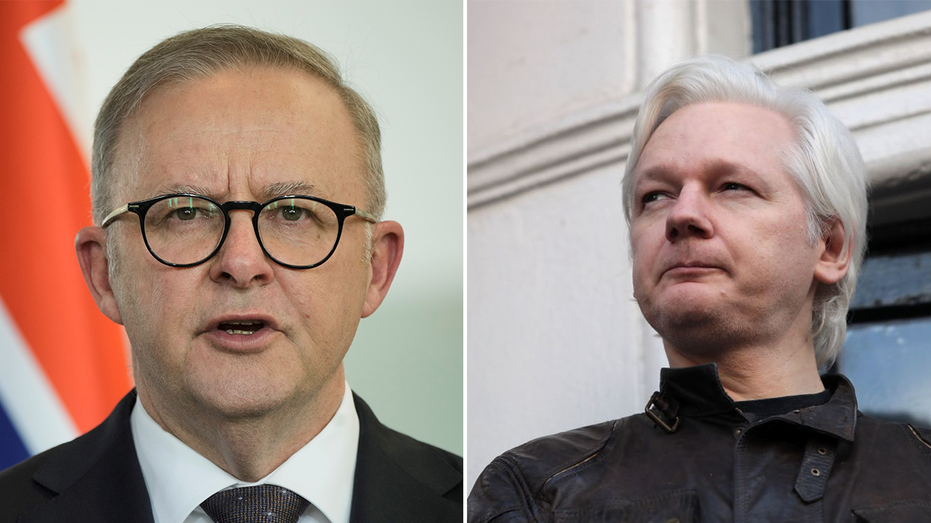Australian Prime Minister Anthony Albanese said Tuesday that his government is standing firm against the U.S. and its prosecution of WikiLeaks founder Julian Assange over the journalist’s publication of classified U.S. military documents more than a decade ago.
Since winning the elections last year, the center-left Labor Party government has been pushing for the U.S. to drop the charges against Assange, who is fighting against extradition to the U.S. to face 17 charges for receiving, possessing and communicating classified information to the public under the espionage act and one charge alleging a conspiracy to commit computer intrusion. He could be sentenced to as many as 175 years in an American maximum security prison if he is extradited.
The Australian journalist has been held at London’s high-security Belmarsh Prison since he was removed from the Ecuadorian Embassy on April 11, 2019, for breaching jail conditions. He had sought asylum at the embassy in London to avoid extradition to Sweden over allegations he raped two women due to Sweden failing to ensure it would protect him from a U.S. extradition. The investigations into the sexual assault allegations were eventually dropped.
U.S. Secretary of State Antony Blinken said during a visit to Australia on Saturday that Assange is accused of “very serious criminal conduct” in publishing hundreds of thousands of classified U.S. military documents in 2010 after U.S. Army intelligence analyst Chelsea Manning leaked them to Wikileaks.
DOJ PRESSURING JOURNALISTS TO AID ITS PROSECUTION AGAINST JULIAN ASSANGE: REPORT
Assange’s prosecution is in connection with the publication of cables detailing war crimes committed by the U.S. government in the Guantánamo Bay, Cuba, detention camp, Iraq and Afghanistan. The materials also expose instances of the CIA engaging in torture and rendition.
Wikileaks’ “Collateral Murder” video showing the U.S. military gunning down civilians in Iraq, including two Reuters journalists, was also published 13 years ago.
“I understand the concerns and views of Australians. I think it’s very important that our friends here understand our concerns about this matter,” Blinken told reporters on Saturday.
But on Tuesday, Albanese responded by saying, “This has gone on for too long. Enough is enough.”
The prime minister told reporters that Blinken’s public comments were similar to previous remarks the Biden administration has made during private discussions with Australian government officials.
“We remain very firm in our view and our representations to the American government, and we will continue to do so,” Albanese said.
Assange’s case was discussed in annual bilateral meetings in Brisbane, Australia, last week between Blinken and Australian Foreign Minister Penny Wong. Speaking to reporters on Saturday, Wong said Australia wanted the charges “brought to a conclusion.” Australia remains ambiguous about whether the U.S. should end the prosecution or reach a plea deal.
Australian officials argue that there is a disconnect between the U.S. government’s treatment of Assange and Manning. Former President Obama commuted Manning’s 35-year sentence, for violations of the Espionage Act and other offenses, to seven years.
The Obama administration decided not to indict Assange after Wikileaks published the cables in 2010 because it would have had to also indict journalists from major news outlets who published the materials as well. But Former President Trump’s Justice Department later moved to indict Assange under the Espionage Act, and the Biden administration has continued to pursue his prosecution.
Last year, the editors and publishers of U.S. and European news outlets that worked with Assange on the publication of excerpts from more than 250,000 documents he obtained in the Cablegate leak — The Guardian, The New York Times, Le Monde, Der Spiegel and El País — wrote an open letter calling for the U.S. to end its prosecution of Assange.
On Capitol Hill, Rep. Rashida Tlaib, D-Mich., led a letter to the Justice Department earlier this year demanding the charges against Assange be dropped.
Albanese said in an interview in May he was “frustrated” that there has not been a diplomatic solution to Assange’s continued detention and that he was concerned about the Wikileaks founder’s mental health.
“I can’t do more than make very clear what my position is and the U.S. administration is certainly very aware of what the Australian government’s position is,” Albanese said at the time. “There is nothing to be served by his ongoing incarceration.”
AUSTRALIAN LAWMAKERS MEET WITH US ENVOY TO PUSH FOR END TO JULIAN ASSANGE’S PROSECUTION
During the Trump administration, the CIA reportedly had plans to kill Assange over the publication of sensitive agency hacking tools known as “Vault 7,” which the agency said represented “the largest data loss in CIA history,” Yahoo reported in 2021. The CIA had discussions “at the highest levels” of the administration about plans to assassinate Assange in London. And, acting on orders from then-CIA director Mike Pompeo, the agency had also drawn up kill “sketches” and “options.”
According to the report, the CIA had advanced plans to kidnap and rendition Assange and had made a political decision to charge him.
Wikileaks also published internal communications in 2016 between the Democratic National Committee and then-presidential candidate Hillary Clinton’s campaign. The communications revealed the DNC’s attempts to boost Clinton in that year’s Democratic primary.
The Associated Press contributed to this report.
























